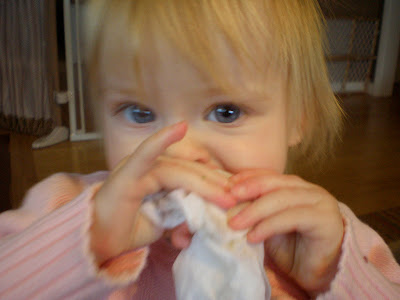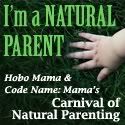Pink, Pink: you stink!
Pink: avoid it like the plague of anti-girl-power it may be or wrap yourself up in it's warm cuteness?
We've been boycotting the all-pink-all-the-time look for Uli. When we could find alternatives, that is (have you seen the girl's section in the stores? It's like the Energizer bunny exploded in there!
Our boycott started when I was pregnant. We'd decided to wait until the birth to learn the sex of the baby. And then we observed people* FREAKING OUT because they believed we shouldn't buy anything but "gender neutral" colors for the baby: anemic duckling yellow, been-too-long-in-the-fridge celery green, and new-apartment-white items only. Apparently a boy's skin will burn if it touches pink and a girl wearing blue will always be assumed to be a boy (and thus forever endure emotional hardship? Or something?).
And because clearly women never wear blue or red or orange and men never wear pink or salmon or anything other than blue, thus neither should their babies.
Whatev. We were over it.
[Girls Are] Sugar and Spice, Barbies are soooo pretty, I want ten plastic surgeries by the time I'm 23 to be sure I'm the best me I canlookbe, I wear pink because I'm soft and squishy and genteel and girlie and 'Who cares if I don't understand math 'cause I'm cute!'
But, OK. Really, what's up with the pink? Here we've been, hating on it, but, I mean, it's a color.
Of candy.
Of a fish.
Of flowers.
Also: the name of a rather fierce and fun pop star
And where would Floyd be without it?
So, yes, pink is a color. "Just" a color.
But colors convey messages. Colors say something about their wearer. And at this time in this place of the world pink is for bunny ears, not for a smart, powerful, important-person. Not even among the new fashionables of Washington. I didn't see any women wearing pink suits to the State of the Union last week. Red, yes. Purple, yes. Bright crazy yellow, yes. But no pink. [Edited to say: okay. So there was that one woman (see the yellow link) in an all pink suit. But you think it looks weird, no? She sticks out like a sore thumb (i.e. not in a good way!)]
However, should the fact that others think so and such about something dictate our choices always? Of course not. I'm pro- cardigans, tie-dye, nose piercings, tattoos, and penny loafers (even if they're all on teh same person at the same time!). I've just got a thing about pink on little girls.
Also, remember the evil professor lady from Harry Potter? She wore all pink all the time. And if being anti-her on principle isn't enough reason for you to avoid the color, ask yourself why she chose pink as her badge. Perhaps just because she liked it, but perhaps she wore it because she found her sneaky underhanded cruel sucker-punchy ways were well camouflaged by a cover of adorable soft pink. Pink screams, "Don't take me seriously"; she could womp on people without them seeing it coming. And then, when her victims cried Foul others wouldn't be certain who to believe. I mean, come on, she's dressed all in pink! You can't be
Anyway, as you may have gathered by the photo above, regardless of all our former/current concerns, Uli is now wearing pink. We recently received a generous box of hand-me-downs from a very kind and nearly total stranger. And, of course, being "girl clothes," all the items are pink.
And, honestly, I think I'm okay with it. I wear pink. Her daddy wears pink. Pink is nice. But I don't like that pink is so overwhelmingly the "girl" color. It should just be a color. For people. And for bunnies. It annoys me that if I am going to buy clothing for Uli I have to search to find something that's not pink. Let's get a little variety in here, designers! Girls like blue (and green and orange and black and crazy bright yellow) too!
*Strangers. People at the stores. And a few co-workers. Our families, however, were totally cool and bought us both blue and pink things. THANK YOU!










